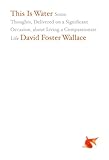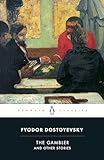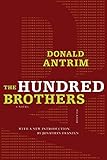 I had set out to review Jonathan Franzen’s newest release (Farther Away: Essays) with only one goal in mind — “Do Not Mention David Foster Wallace.” The constant invocation of one for the sake of the other, although reasonable enough, always struck me as the comparison every commentator can and will often needlessly draw. Imagine reading an article about Eric Clapton in which the name “Jimi Hendrix” appears — casually, frequently — only for the sake of providing a sense of scale and equivalence. “Needless,” I would say, because to appreciate one is at least to be familiar with the other. Or so I thought.
I had set out to review Jonathan Franzen’s newest release (Farther Away: Essays) with only one goal in mind — “Do Not Mention David Foster Wallace.” The constant invocation of one for the sake of the other, although reasonable enough, always struck me as the comparison every commentator can and will often needlessly draw. Imagine reading an article about Eric Clapton in which the name “Jimi Hendrix” appears — casually, frequently — only for the sake of providing a sense of scale and equivalence. “Needless,” I would say, because to appreciate one is at least to be familiar with the other. Or so I thought.
In Farther Away, the linkage between Wallace and Franzen is not merely suggested but rather invited, and Franzen’s collection opens a door to the gearbox of his own mind’s attempt to reorder itself around the death of his friend — not just Infinite Jest’s David Foster Wallace, but Dave, the man whose ashes Franzen scatters from a small book of matches in the essay “Selkirk” and the central figure of a touching reflection (“David Foster Wallace”) on the late writer’s ultimate decline. We find out that the tragically funny prose Wallace spun in Infinite Jest was not just for us — “Those sentences and those pages, when he was able to be producing them, were as true and safe and happy a home as any he had during most of the twenty years I knew him” — and that when he could no longer find solace there, “the disease killed the man as surely as cancer might have.”
 Farther Away opens with Franzen’s 2011 commencement speech at Kenyon College (“Pain Won’t Kill You”), where Wallace delivered his own address (later released as This is Water) in 2005. Similar themes echo in the two speeches — the assault of techno-consumerism on the pliable mind, for example, and the necessity of “putting yourself in real relation to real people…that you might end up loving.” Franzen focuses the lens ever-more inward, however, and highlights the dangers posed by a culture of individuals hyper-focused on themselves and conditioned by a level of social networking that was unimaginable in 2005: “To friend a person is merely to include the person in our private hall of flattering mirrors,” he says.
Farther Away opens with Franzen’s 2011 commencement speech at Kenyon College (“Pain Won’t Kill You”), where Wallace delivered his own address (later released as This is Water) in 2005. Similar themes echo in the two speeches — the assault of techno-consumerism on the pliable mind, for example, and the necessity of “putting yourself in real relation to real people…that you might end up loving.” Franzen focuses the lens ever-more inward, however, and highlights the dangers posed by a culture of individuals hyper-focused on themselves and conditioned by a level of social networking that was unimaginable in 2005: “To friend a person is merely to include the person in our private hall of flattering mirrors,” he says.
The omnipresent banalities of the smartphone era stoke Franzen’s preoccupation with the ego-centrism of contemporary life. In the scathing “I Just Called to Say I Love You,” he cringes at the forever-nearby din of that which he would prefer not to hear even from a distance — “The cellular component of my irritation is straightforward. I simply do not, while buying socks at the Gap, or standing in a ticket line and pursuing my private thoughts, or trying to read a novel on a plane that’s being boarded, want to be imaginatively drawn into the sticky world of some nearby human being’s home life.” The cell phone, he argues, “has done lasting harm of real social significance,” having replaced the cigarettes of earlier decades as the delivery mechanism of the “suffering of a self-restrained majority at the hands of a compulsive minority.” Franzen, with a measure of irony, bemoans the ubiquity of “I love you!” via cell phone in public spaces (particularly after 9/11) because “the person seems to be saying to me and to everyone else present: ‘My emotions and my family [his emphasis] are more important to me than your social comfort.’”
But if there is any respite from his day-to-day troubles, it certainly comes in the form of watching, cataloguing, and advocating for the preservation of rare birds. “When I go looking for a new bird species,” Franzen says, “I’m searching for a mostly lost authenticity, for the remnants of a world now largely overrun by human beings but still beautifully indifferent to us; to glimpse a rare bird somehow persisting in its life of breeding and feeding is an enduringly transcendent delight” (“Farther Away”).
In perhaps the best essay of the lot, “The Ugly Mediterranean,” Franzen chronicles his travels through Cyprus, Malta, and Italy and renders with surprising even-handedness the duality of the societal forces that contribute to regular trapping, hunting, and consumption of migratory songbirds. While in Cyprus, during an excursion to liberate birds stuck in home-rigged snares, he and his compatriots receive blows at the hands of local trappers, themselves impassioned to preserve a cultural (and economic) imperative. The essay is peppered with species of birds Franzen can casually name at sight — not with the cool, detached interest of a scientist but rather with the ardor of someone who would (and has) risked blows from a baseball bat for the sake of rescuing just one more object of his affection.

 Another joy for Franzen is in contemplation of Serious Fiction. “Can a better kind of fiction save the world?” he asks (“What Makes You So …”). “There’s always some tiny hope (strange things do happen), but the answer is almost certainly no, it can’t. There is some reasonable chance, however, that it could save your soul.” Although his musings on selected pieces are likely more accessible for those who have read the works in question, each essay serves equally well as a window into where Franzen draws the line between Serious Fiction and…everything else. In “The Corn King,” a review of The Hundred Brothers, Franzen extols Donald Antrim as an author whose singular work “speaks like none of us for all of us…because we all inescapably feel ourselves to be the special center of our private worlds.” He reaches back to Dostoyevsky’s The Gambler for a discourse on materialism, nihilism, and “the impossibility of pressing the Pleasure bar forever” (pausing along the way to mention Wallace once again). Franzen even turns pragmatic, advising other writers to avoid the use of “Comma-Then” should they wish to avoid churning out “fiction-workshop English.”
Another joy for Franzen is in contemplation of Serious Fiction. “Can a better kind of fiction save the world?” he asks (“What Makes You So …”). “There’s always some tiny hope (strange things do happen), but the answer is almost certainly no, it can’t. There is some reasonable chance, however, that it could save your soul.” Although his musings on selected pieces are likely more accessible for those who have read the works in question, each essay serves equally well as a window into where Franzen draws the line between Serious Fiction and…everything else. In “The Corn King,” a review of The Hundred Brothers, Franzen extols Donald Antrim as an author whose singular work “speaks like none of us for all of us…because we all inescapably feel ourselves to be the special center of our private worlds.” He reaches back to Dostoyevsky’s The Gambler for a discourse on materialism, nihilism, and “the impossibility of pressing the Pleasure bar forever” (pausing along the way to mention Wallace once again). Franzen even turns pragmatic, advising other writers to avoid the use of “Comma-Then” should they wish to avoid churning out “fiction-workshop English.”
 Ultimately, Farther Away is a meditation on the obscure other half of a world right in front of our faces — the private horror of a public figure struggling with depression, the unspoken loneliness of an individual living in a world of people perpetually turned off because their devices are turned on, the perils of a bird in flight, and cherished pages of well-written fiction that enable us “to embrace, even celebrate, the dark fact that an individual’s life consists, finally, of an accelerating march toward decay and death.” Franzen brings the reader close (uncomfortably, at times) to facets of life not usually examined, and it becomes clear that he is not just talking about songbirds when he writes, “It felt wrong to be seeing at such close range a species that ordinarily requires careful work with binoculars to get a decent view.” Not every piece soars, but none fails to get off the ground, and as Franzen notes in his essay on Christina Stead’s The Man Who Loved Children, “…it’s the kind of book that, if it is for you, is really for you.”
Ultimately, Farther Away is a meditation on the obscure other half of a world right in front of our faces — the private horror of a public figure struggling with depression, the unspoken loneliness of an individual living in a world of people perpetually turned off because their devices are turned on, the perils of a bird in flight, and cherished pages of well-written fiction that enable us “to embrace, even celebrate, the dark fact that an individual’s life consists, finally, of an accelerating march toward decay and death.” Franzen brings the reader close (uncomfortably, at times) to facets of life not usually examined, and it becomes clear that he is not just talking about songbirds when he writes, “It felt wrong to be seeing at such close range a species that ordinarily requires careful work with binoculars to get a decent view.” Not every piece soars, but none fails to get off the ground, and as Franzen notes in his essay on Christina Stead’s The Man Who Loved Children, “…it’s the kind of book that, if it is for you, is really for you.”



